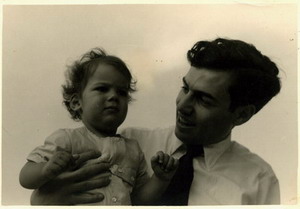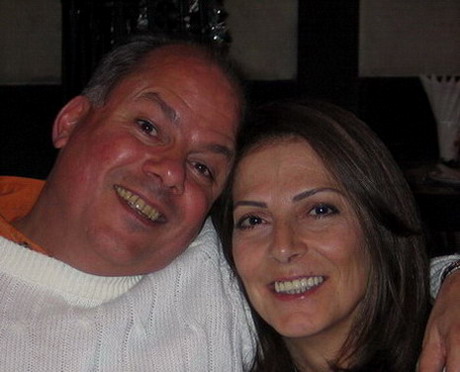Hamed, and in the middle with Solhi, Cynthia, Widad, and me hiding behind Hamed
Solhi was very proud of his father, and he revered him. Hamed travelled a lot, all over the world, but whenever he came to visit us in Syria it was always a ritual. Most often it would be by car coming from Beirut, and Solhi would be at the border, with us in tow, meeting him.
Hamed in Lebanon
Hamed in the early 50's developing the farmlands
Hamed was a devout religious person, a trait that Solhi and Hamed didn’t share, but in deference to Hamed’s feelings, whenever he got word that Hamed was coming, Solhi would make me memorise a verse from the Koran. And when Hamed arrived at our house, before he would sit down, Solhi would ask me to recite the verse I’d memorised in front of Hamed. Those moments were special to Hamed.
Hamed on the farmlands
Hamed had a special place in his heart for me, and like Solhi, I called him Baba. I always looked forward to his visits, mostly for selfish reasons, for whenever he visited I always ended up with 100 Iraqi Dinars in my pocket when he left, that was a lot of money in those days. But Solhi, always thrifty, and always conscious to teach us the value of money, would take it from me and put it in his ancient safe for me.
Hamed in Alexandria dropping Solhi off at VC
Hamed died in Baghdad on 8th August 1966. Solhi was 32 years old, I was 10. Solhi was again to be devastated. He was in Damascus at the time. There was no fuss, no sign that there was anything wrong. All I remember was walking into the living room and seeing Solhi sitting in his chair staring blankly into space. When he saw me walking into the room he looked at me and told me that Baba had died, and then broke down crying. All I could do was go to him and hug him. I remember him holding on to me for what seemed like an eternity. That hug will remain in my memory forever.
Solhi at around the age Hamed died
To my childlike eyes, Solhi’s relationship with his father was a complex one. I later learned that Hamed did not initially approve of Solhi marrying Cynthia, he did not see that there was a future in a multicultural relationship. Solhi’s uncle Shaker, who was Iraqi Foreign Minister in the mid 1950’s, introduced a law forbidding Iraqis from marrying a foreigner, and that was a cause of a family dispute that lasted over a year.
Solhi with his uncle Shaker
Whether by design or by default Solhi still was a rebel. However, eventually both sides relented and reconciliation took place. Both Solhi and Cynthia proved that their relationship was solid and extremely strong, time was the ultimate proof. Their marriage lasted 52 years, until Solhi died.









Solhi and Cynthia at various stages in their lives
Solhi, seated 2nd from left, sampling food the tribal way with body guards looking on
With Hamed’s death Solhi also found himself unexpectedly burdened with huge death duties that would take him 10 years to pay off. He also inherited large farmlands that he didn’t know what to do with. Over the years he had many offers to sell the lands but he always rejected them in respect of the memory of his father who worked hard to build and develop them. And Solhi was never materialistically minded, wealth meant nothing to him.
He did however realize that he would have to travel more often to make sure that his father’s legacy was not abused, and not wanting to disturb my education he made a momentous decision to send me to boarding school. This proved to be a turning point in our family’s life.


Me at around the age that Hamed died
Having himself gone to boarding school at Victoria College he knew what effects boarding schools have on young children. I was 11 at the time, the same age he was when he was sent to VC. His dilemma at the time was where to place me. VC was out of the question since it was nationalised by Gamal Abdul Nasser following the Suez Crisis in 1956, and its status and standards had declined. The matter was settled by an old friend of his, Kamal Haffar, who boarded at Brummana High School in Lebanon, and whose sons Rifaat and Omar were boarding there at the time. And this is how it came that I was sent to BHS, considered then to be one of the best schools in the Middle East.




Brummana High School (Pictures courtesy of Francis Hudson Nehme)
So in October 1967 I was taken to Brummana and dropped off at BHS. My mother promised that she would come visit me the following weekend, and on that Saturday I waited, and waited, but she never showed up. I felt completely alone for the first time in my life. I would later learn that she, being British and requiring a visa, was unable to get one in time.
Me in Beirut at 11 being dropped off at BHS for the first time
In my early days at BHS Solhi would come to pick me up to take me home for the Christmas, Easter and Summer holidays, he would also take me back when the holidays ended. Early on I would look forward to the journey back to Damascus, but as time passed I became more excited about returning to BHS than leaving it. This must have been a cause of irritation to Solhi, but he never showed it.

Solhi in a moment of relaxation
One time on the way back to Brummana we arrived at the border and Solhi asked me for my passport. My heart sank as I suddenly realised that in my excitement I’d forgotten to pick my passport up. Solhi looked at me, with his famous frown, and after what seemed like an eternity he reached into his pocket and produced my passport. He didn’t need to say much after that. I learnt my lesson, and I’ve become meticulously careful ever since.
Solhi, Cynthia, Diala and Hamsa circa 1977
In those younger years I didn’t realise the sacrifice my parents were making by sending me away to school. I missed them badly but considered it a part of life. The signs were there though.
Solhi in Iraq
One day in heavy rain, I was still in primary school, a friend and I, (and to this day I remember who that friend was,) were kicking a football around in a sheltered area and I noticed a man out in the pouring rain, wearing a long raincoat, standing, soaking wet, and freezing cold, waving in our direction. For a long time I didn’t give him a second thought, but every time I looked in his direction he would wave. As I looked over to this man, once, and then twice, I started to think he looks very much like Solhi. I wasn’t expecting him. Eventually I walked over to have a closer look, and sure enough, it was him! Once I realised it was him I couldn’t get to him fast enough, I ran to him and jumped into his arms and hugged him as hard as I could. He had driven over 4 hours in horrendous weather just to see me for an hour, and then drove back home.
In Baghdad
Some 25 years later, during a visit to the UK, Solhi, out of the blue turned to me and asked me a question that he said he had always wanted to ask me: did he make a mistake by sending me to BHS? The question came as a surprise since I never, ever, imagined he had any self doubt about any decision he made. The relief on his face was palpable when I told him that my 8 years at BHS were the best years of my life.




















































